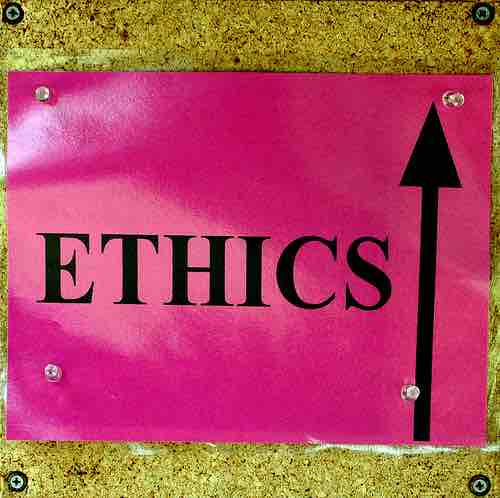Law and ethics are not the same thing. Both exist to influence behavior, but complying with the law is mandatory, while adhering to an ethical code is voluntary. Laws define what is permissible, while ethics speak to what is right, good, and just. Lawyers and judges are responsible for clarifying the meaning of a law when there is ambiguity or when a matter is subject to interpretation. Where ethics are concerned, that responsibility lies with each individual. In organizations, employees can look to the code of ethics or the statement of values for guidance about how to handle ethical gray areas.
Even when an individual has a clear sense of right and wrong, or good and bad, it can be difficult to know what is ethical in a given situation. Ethical choices involve judgment because they involve weighing the potential consequences of one's actions for other people. One analyzes ethical issues by asking questions such as: What could happen? How likely is it happen? What might the harm be? Who might be hurt? The answers are not always clear cut.
Individual judgments can be influenced, even clouded, by a number of factors. A study by Professor Robert Prentice suggests that self-image can influence an individual's decision-making process, making him or her feel justified in taking shortcuts or doing things that could be seen as ethically questionable. In addition, there are times when people believe that the ends justify the means. In other words, if the result of an action is good, then it is okay if the action itself is unethical.
There is a saying that a good person is one who does good deeds when no one is looking. The same goes with ethical decisions. People who are ethical follow their beliefs even when they believe no one will find out about what they have done. In many cases of ethical breaches in organizations, those who acted unethically likely believed that they wouldn't be discovered. Others may have thought that if the issues were discovered, the actions wouldn't be traced back to them. They had the opportunity to be ethical but chose not to be.
Business Ethics Around the Globe
Social norms aren't identical in different countries, and ethical standards can vary as well. A business may operate in a country that permits actions that would be considered unethical under that business's ethical code. How will employees working in that country handle that situation, especially if something that could be considered unethical in one place is actually thought to be important to business success in the other? For instance, in some cultures it is customary for business partners and customers to be invited to weddings, with the expectation that guests will give a cash gift to the bride and groom. A company might consider the gift an unethical bribe in exchange for a customer's business, yet it may be essential to enter a new market. Adhering to ethical standards in such instances can be difficult.

This way to ethics
Ethical decisions are not always clear-cut.
Example
American companies are often criticized for the treatment of workers who produce their products in China. However, rules concerning the rights of workers are much more relaxed in China than in the United States. Does an American company have the right to order factory owners in China to change their way of doing business? That is one example of an ethical gray area in today's globalized economy.